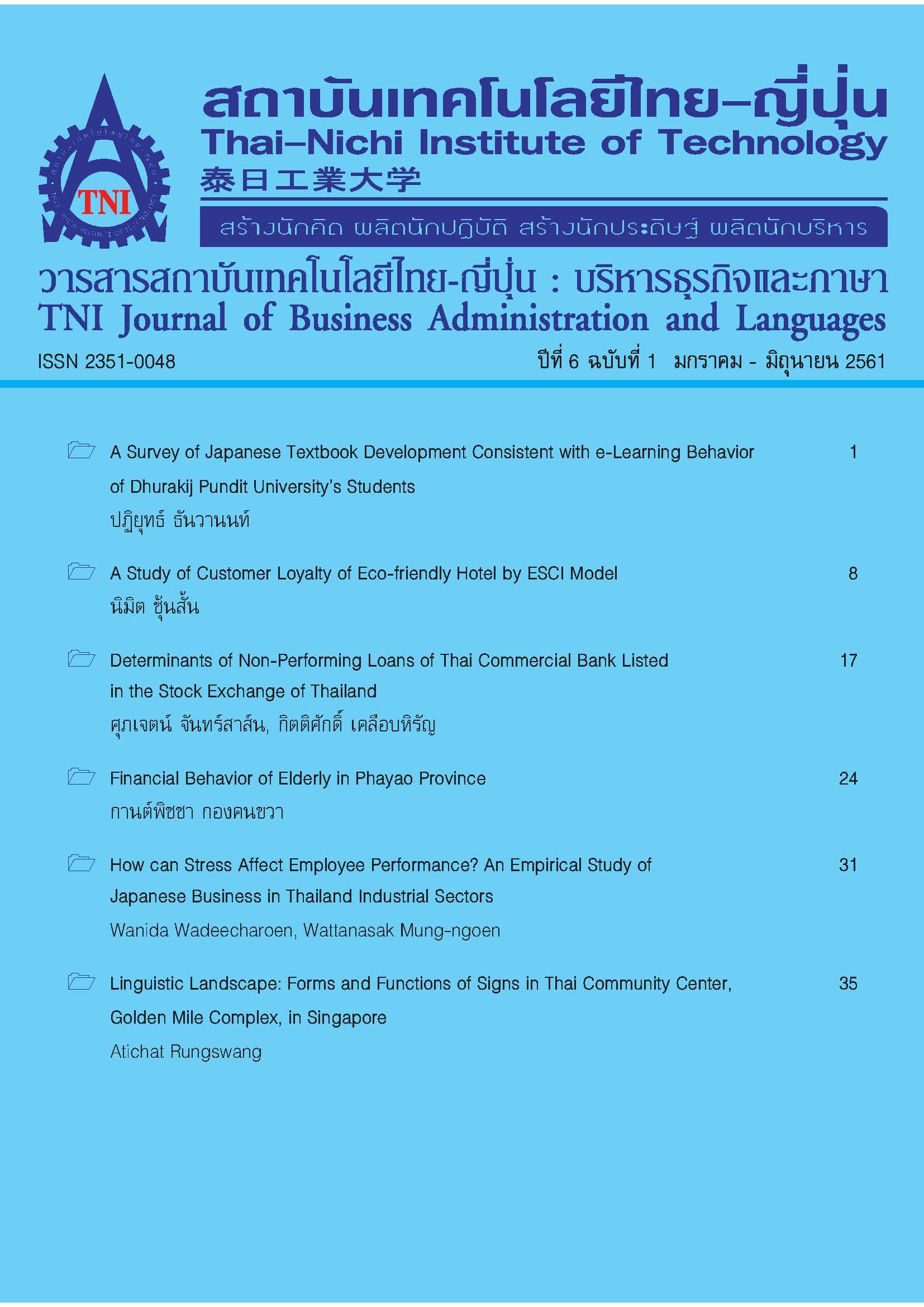A Study of Customer Loyalty of Eco-friendly Hotel by ESCI Model
Main Article Content
Abstract
This research aimed to study factor affected to satisfaction and customer loyalty of eco-friendly hotel by ECSI model. Questionnaire was used as a tool for 400 customers for the quantitative method study. The results showed that reputation and safety, hotel’s website, and service directly affected to customer perceived value. Moreover, perceived value and customer satisfaction were mediators between the factors and customer loyalty which had got the same direction. Study discussion and research suggestion were recommended in this paper.
Article Details
Article Accepting Policy
The editorial board of Thai-Nichi Institute of Technology is pleased to receive articles from lecturers and experts in the fields of business administration, languages, engineering and technology written in Thai or English. The academic work submitted for publication must not be published in any other publication before and must not be under consideration of other journal submissions. Therefore, those interested in participating in the dissemination of work and knowledge can submit their article to the editorial board for further submission to the screening committee to consider publishing in the journal. The articles that can be published include solely research articles. Interested persons can prepare their articles by reviewing recommendations for article authors.
Copyright infringement is solely the responsibility of the author(s) of the article. Articles that have been published must be screened and reviewed for quality from qualified experts approved by the editorial board.
The text that appears within each article published in this research journal is a personal opinion of each author, nothing related to Thai-Nichi Institute of Technology, and other faculty members in the institution in any way. Responsibilities and accuracy for the content of each article are owned by each author. If there is any mistake, each author will be responsible for his/her own article(s).
The editorial board reserves the right not to bring any content, views or comments of articles in the Journal of Thai-Nichi Institute of Technology to publish before receiving permission from the authorized author(s) in writing. The published work is the copyright of the Journal of Thai-Nichi Institute of Technology.
References
“คู่มือเกณฑ์มาตรฐานสถานประกอบการที่พักสีเขียว,” ศูนย์สารสนเทศสิ่งแวดล้อม กระทรวงทรัพยากรธรรมชาติและสิ่งแวด ล้อม, 2555. [ออนไลน์]. แหล่งที่มา:https://thaigreenhotel.com /home/download3.php?linkPath =../upload/download/file/file-436670165.pdf&downloadFile=file-436670165 .pdf&dataid=8. [เข้าถึงเมื่อ: 10-มี.ค.-2560].
“สถิตินักท่องเที่ยว,” กระทรวงท่องเที่ยวและกีฬา. [ออนไลน์]. แหล่งที่มา: https://www.mots.go.th/more_news.php?cid=411. [เข้าถึงเมื่อ: 10-Mar-2560]
กฤษฎา ติยวิวัฒนานุกูล และ โสมสกาว เพชรานนท์, “การบริหารจัดการโรงแรมสีเขียวในมุมมองทางเศรษฐศาสตร์: กรณีศึกษา เกาะเสม็ด,” วารสารเศรษฐศาสตร์และกลยุทธ์การจัดการ, ปีที่ 3, ฉบับที่ 2, หน้า 50-60, 2559.
ปิยะดา วชิระวงศกร และ อุษณีย์ ทิมสูงเนิน, “การประเมินการบริการที่เป็นมิตรกับสิ่งแวดล้อมของสถานประกอบการโรงแรมในเขตภาคเหนือตอนล่าง,” วารสารการจัดการสิ่งแวดล้อม, ปีที่ 11, ฉบับที่ 1, หน้า 98-113, 2558.
สานิตย์ หนูนิล และ ประสพชัย พสุนนท์, ”ปัจจัยที่มีอิทธิพลต่อพฤติกรรมสนับสนุนการเป็นโรงแรมที่เป็ นมิตรกับสิ่งแวดล้อม : กรณีศึกษา โรงแรมดุสิต ปริ๊นเซส ศรีนครินทร์,” วารสารวิทยาลัยดุสิตธานี, ปีที่ 8, ฉบับที่ 1, หน้า 16-33, 2557.
M. Abdullah, A. D. Al-Nasser, and N. Husain, “Evaluating functional relationship between image, customer satisfaction and customer loyalty using general maximum entropy,” Total Quality Management, vol. 11, no. 4–6, pp. 826–829, Jul. 2000.
A. S. Ashton, N. Scott, D. Solnet, and N. Breakey, “Hotel restaurant dining: The relationship between perceived value and intention to purchase,” Tourism and Hospitality Research, vol. 10, no. 3, pp. 206–218, 2010.
B. Brotherton, “Critical success factors in UK budget hotel operations,” International Journal of Op & Prod Management, vol. 24, no. 9, pp. 944–969, Sep. 2004.
C. Chia-Jung and C. Pei-Chun, “Preferences and Willingness to Pay for Green Hotel Attributes in Tourist Choice Behavior: The Case of Taiwan,” Journal of Travel & Tourism Marketing, vol. 31, no. 8, pp. 937–957, Nov. 2014.
B. Chitty, S. Ward, and C. Chua, “An application of the ECSI model as a predictor of satisfaction and loyalty for backpacker hostels,” Marketing Intelligence & Planning, vol. 25, no. 6, pp. 563–580, Sep. 2007.
L. Cometa, “Consumer beliefs about green hotels,” Master’s thesis (Hospitality and Tourism Management), Kent State University, Kent, Ohio, 2012.
W. J. Deng, M. L. Yeh, and M. L. Sung, “A customer satisfaction index model for international tourist hotels: Integrating consumption emotions into the American Customer Satisfaction Index,” International Journal of Hospitality Management, vol. 35, pp. 133–140, Dec. 2013.
P. L. Dawes, Y. Ekinci, and G. R. Massey, “An extended model of the antecedents and consequences of consumer satisfaction for hospitality services,” European Journal of Marketing, vol. 42, no. 1/2, pp. 35–68, Feb. 2008.
H. HeeSup, L. T. Hsu, and C. Sheu, “Application of the Theory of Planned Behavior to green hotel choice: testing the effect of environmental friendly activities.,” Tourism Management, vol. 31, no. 3, pp. 325–334, 2010.
H. Han, L.-T. J. Hsu, J.-S. Lee, and C. Sheu, “Are lodging customers ready to go green? An examination of attitudes, demographics, and eco-friendly intentions,” International Journal of Hospitality Management, vol. 30, no. 2, pp. 345–355, Jun. 2011.
H. Han, “Travelers’ pro-environmental behavior in a green lodging context: Converging value-belief-norm theory and the theory of planned behavior,” Tourism Management, vol. 47, pp. 164–177, Apr. 2015.
H. Han, K.J. Back, and B. Barrett, “Influencing factors on restaurant customers’ revisit intention: The roles of emotions and switching barriers,” International Journal of Hospitality Management, vol. 28, no. 4, pp. 563–572, Dec. 2009.
D. Hays, and D.Ozretic-Dosen, “Green hotels – Building green values into hotel services”. Tourism and Hospitality Management, vol.20, no.1, pp. 85-102, 2014.
K. H. Kang, L. Stein, C. Y. Heo, and S. Lee, “Consumers’ willingness to pay for green initiatives of the hotel industry,” International Journal of Hospitality Management, vol. 31, no. 2, pp. 564–572, Jun. 2012.
Y. J. Kim, R. Palakurthi, and M. Hancer, “The Environmentally Friendly Programs in Hotels and Customers’ Intention to Stay: An Online Survey Approach,” International Journal of Hospitality & Tourism Administration, vol. 13, no. 3, pp. 195–214, Jul. 2012.
M. Millar and S. Baloglu, “Hotel Guests’ Preferences for Green Hotel Attributes,” Hospitality Management, 2008. [Online]. Available: https://repository.usfca.edu/hosp/5. [Accessed: 26-Jun-2017].
I. Rahman and D. Reynolds, “Predicting green hotel behavioral intentions using a theory of environmental commitment and sacrifice for the environment,” International Journal of Hospitality Management, vol. 52, pp. 107–116, Jan. 2016.
E. Robinot and J. L. Giannelloni, “Do hotels’ ‘green’ attributes contribute to customer satisfaction?,” Journal of Services Marketing, vol. 24, no. 2, pp. 157–169, Apr. 2010.


